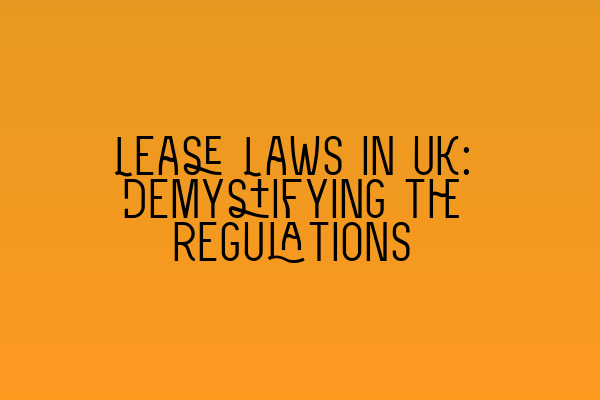Lease Laws in the UK: Demystifying the Regulations
Are you a property owner or tenant in the UK? Are you aware of the lease laws and regulations that govern your rights and obligations? Understanding lease laws is crucial for both landlords and tenants to ensure a smooth and stress-free property experience. In this blog post, we will demystify lease laws in the UK, explaining the essential regulations that you need to know.
Introduction to Lease Laws in the UK
Lease laws in the UK primarily focus on the relationship between landlords and tenants. These laws aim to protect the rights of both parties while fostering fair and transparent dealings. Whether you are a residential or commercial leaseholder, familiarizing yourself with the lease laws will help you make informed decisions and navigate any potential disputes with ease.
Key Lease Laws and Regulations
1. The Landlord and Tenant Act 1985: This act provides a comprehensive framework for the rights and responsibilities of landlords and tenants. It covers areas such as rent payments, repairs, and the duration of the tenancy. Understanding the provisions of this act is essential to ensure compliance and avoid legal issues.
2. Security of Tenure: The Landlord and Tenant Act 1954 introduced security of tenure for commercial leases. This means that tenants have the automatic right to renew their lease at the end of the term, subject to certain conditions. As a commercial tenant, understanding the implications of security of tenure is vital for your business stability.
3. Assured Shorthold Tenancies (ASTs): An AST is the most common residential tenancy in the UK. It provides tenants with specific rights, such as protection from eviction without a valid reason. Landlords who grant ASTs must adhere to the specific rules and regulations outlined in the Housing Act 1988.
4. Deposit Protection: The Housing Act 2004 introduced deposit protection schemes to safeguard tenants’ deposits and ensure fair treatment. Landlords must protect the tenant’s deposit within 30 days of receiving it and provide the tenants with details of the scheme being used. Failure to comply can lead to severe financial penalties for landlords.
5. Repairs and Maintenance: One of the fundamental responsibilities of landlords is to ensure that the property is safe, habitable, and in good repair. The Landlord and Tenant Act 1985 sets out the landlord’s obligations, including maintaining the structure of the property, gas and electrical safety, and providing hot water and heating facilities.
6. Service Charges: If you are a leaseholder of a flat or an apartment, you may be required to pay service charges for the upkeep of the building, communal areas, and facilities. The Commonhold and Leasehold Reform Act 2002 enforces transparency in service charges, ensuring leaseholders are fully aware of what they are paying for and how the charges are being used.
7. Lease Extensions and Enfranchisement: The Leasehold Reform, Housing and Urban Development Act 1993 provides leaseholders with the right to extend their lease or collectively purchase the freehold of their property. Understanding these rights and the process involved is essential for leaseholders to protect their long-term interests.
Expert Advice for Navigating Lease Laws
While understanding lease laws in the UK is crucial, it can often be complex and overwhelming. Seeking expert legal advice from a solicitor specializing in property law is highly recommended to ensure you fully comprehend your rights and obligations.
At SQE Property Law & Land Law, our team of experienced solicitors is well-versed in lease laws and regulations. From tenancy agreements and lease negotiations to dispute resolution, we can provide you with expert advice and legal representation tailored to your specific needs.
Conclusion
Lease laws in the UK play a vital role in safeguarding the interests of both landlords and tenants. By familiarizing yourself with these regulations, you can ensure a transparent and harmonious property experience. Remember, seeking the guidance of a knowledgeable solicitor is crucial when dealing with lease laws to protect your rights and navigate any potential legal complexities.
Contact SQE Property Law & Land Law today to schedule a consultation with our expert team. Let us demystify the lease laws for you and provide the professional guidance you need for a successful property journey.
